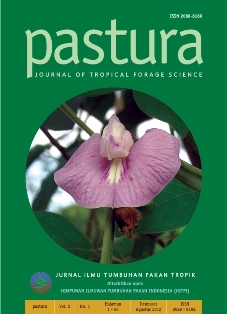PENAMBAHAN INOKULUM DALAM MENINGKATKAN KUALITAS JERAMI KEDELAI EDAMAME (Glycine max var Ryokhoho) SEBAGAI PAKAN TERNAK
Abstract
This research was conducted to investigated the effect of rhizobium inoculation and harvesting time on the productivity of edamame and the chemical composition in the straw edamame. This study was planted edamame soy bean seed. This experiment was carried out in green house used regosol soil in polybag, 2x2 factorial experiment with five replication was arranged in completely randomized design, continued by Duncan’s multiple range test (DMRT) for the significant result. The first factor was harvesting time (U) consisting of harvested at 65 days (U1) and harvested at 75 days (U2); the second factor was inoculant (I) consisting of with inoculation (I1) and without inoculant (I0). The result of the study showed, that underground dry weight (DW) mass yield and DM and OM straw productions, crude protein (CP), nitrogen free extract (NFE) of UP1 were higher (P<0.01) and ash of straw were higher(P<0.05) than UP2. DM and OM pod productions of UP1 was also superior (P<0.05) than UP2. UP2 resulted better fiber crude (FC) (P<0.01) than UP1. Inoculation (L1) resulted better DM and OM straw productions and CP of straw (P<0.01), and underground DW mass yield, FC, NFE of straw were affected (P<0.05) by interaction between treatments. Underground DW mass yield, FC, NFE, DM and OM of straw, and pods productions were not affected by interaction. And all the treatments were also not affected ether extract (EE) of straw.The results of experiment shown that legin factor not signification of in vitro digestibility. The harvest time (U1) was higher (P<0.05) than harvested at 75 days. Interaction among two factors not significant on in vitro organic matter digestibility.Downloads
Download data is not yet available.
How to Cite
UMAMI, Nafiatul et al.
PENAMBAHAN INOKULUM DALAM MENINGKATKAN KUALITAS JERAMI KEDELAI EDAMAME (Glycine max var Ryokhoho) SEBAGAI PAKAN TERNAK.
Pastura, [S.l.], v. 2, n. 1, june 2014.
ISSN 2549-8444.
Available at: <https://ojs.unud.ac.id/index.php/pastura/article/view/9012>. Date accessed: 24 feb. 2026.
doi: https://doi.org/10.24843/Pastura.2012.v02.i01.p06.
Issue
Section
Articles
Keywords
Edamame straw, harvesting time, inoculation, productivity, chemical composition, in vitro digestibility.





